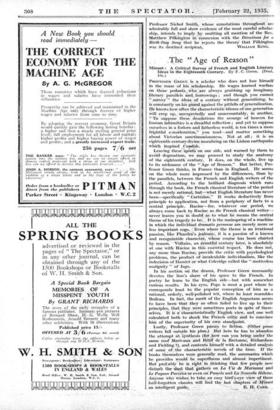'The "Age of Reason
PROFESSOR GREEN is a scholar who does not lose himself in the maze a his _ scholarship. He wages learned warfare
on those pedants whoare always grubbing up imaginary
'literary- parallels and borrowings; and though you cannot survey" the -ideas of- a century without generalizing, he is constantly on his guard.against the pitfalls of generalization. He knows how often the characteristic idioms of one generation
will crop up,: unexpectedly and unaccountably, in another.
" To suppose these desolations the scourge of heaven for human _infirmities is a dreadful reflection ; and yet to suppose ourselves in a forlorn and fatherless world, is ten times a more frightful consideration," you read—and mutter something about Victorian sanctimoniousness. Not at all ; it is an eighteenth-century divine moralizing on the Lisbon earthquake which inspired Candide. . Leaving these -sports on one side, and warned by them to avoid, dogmatism, we may proceed to study the anatomy of the eighteenth century. It does, on the whole, live up to its nickname of the "Age of Reason." But better, Pro- fessor Green thinks, in France than in England. He seems on the whole more impressed by the differences, than by the parallels, between the French and English writers of the period. According to the brilliant diagnosis which runs through the book, the French classical literature of the period is not merely rational, but-what English literature has never been—specifically "Carte-sian." It works deductively from principle to application, not from a periphery of facts to a central principle. Racine—for, whatever our period, we always come back ta Racine as the French classical writer—. never leaves you irCdoubt as to what he means the central theme of his tragedy lo be. It is the mainspring of a maeliine in which the individual dramatis personae are merely more or less impOrtant cogs. Even where the theme is an irrational passion, like Phaedra's jealousy, it is a passion of a known and recognizable character, Whose course has been charted by reason. Vitiltaire, an eventful century later, is absolutely at one with Racine in this essential respect. He does not, any more than'llacine; provide the critic with psychological problems, the produot of incalculable individualism, like the indecision of Hamlet or what Coleridge called the "motiveless malignity" of lago.
In his section, on, the drama, Professor Green necessarily devotes the lion's share of his space to the French. In poetry he leans to the English side—but with somewhat curiOus results. In his eyes, Pope is most a poet where 'he corresponds' least to. the popular conception of him as a rational, orderly, well-polished wit, where he least resembles Boileau. hi fact, the merit of the English Augustans seems to have been -that they so -often failed to live up to their principles, that they were sometimes poets in spite of them- selves It is a characteristically 'English view, and one well calculated both to shock the French Critic and to convince hid' of the superiority of his own standpoint.
Lastly, Professor Green passes to' fiction. (Other prose writers fall outside his plan.) But here he has to abandon the attempt at.: hsynthesis (for bow can you bring under" the same roof Marivaux and Retif de la Bretanne; Richardson and Fielding ?), and contents' himself with a detailed analysis of some of the characteristic novels of the time. If the books themselves were generally read, the summaries which he provides would be superfluous and almost impertinent. But protably he is right- in thinking that few people now disturb the 'Oust that gathers on La Vie de Marianne and Le Payson Parvenu or even on Pamelaand La Nouvelle Heloise. Anyone Who wishes to take an easy bird's-eye view of these half-forgotten classics will find' the last chapters of Mnua


















































 Previous page
Previous page